Carl E. Olson's Blog, page 110
February 14, 2014
Carl's (Lovely) Cuts for Valentine's Day, 2014
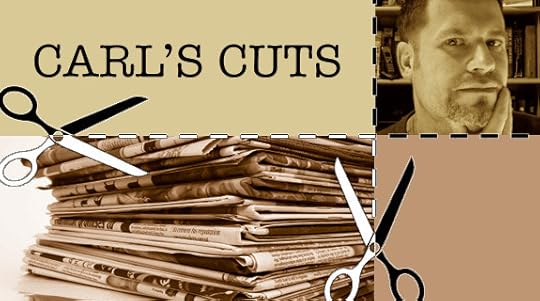
Carl E. Olson | CWR blog
• These Valentine's Day Cuts are belated. Much like my Valentine's Day card for my ex-girlfriend. Who I've been married to for almost twenty years.
• G. K. Chesterton, the master of paradox, on Valentine's Day: "St. Valentine was a priest and denied himself the love of women; but his feast has been turned into a day for love-making." From Alarms and Discursions (1911).
• What is love? And why do we love? And what is the basis of love? I tackled those questions, in however lacking manner, in an essay, "Love and the Skeptic", published in This Rock several years ago. An excerpt:
But what is willed by loving? When we say to another: "It is good that you exist, that you are!"—what do we mean? The question is not nearly as abstract or obtuse as it might sound, for it does serious damage to the flippant claim that man is able to "make a meaning," for love is not about making something ex nihilo, but the recognition and affirmation of what already is. Or, put another way, in seeing the good of another, we choose to embrace and treasure that good.
So Pieper makes an essential distinction: "For what the lover gazing upon his beloved says and means is not: How good that you are so (so clever, useful, capable, skillful), but: It’s good that you are; how wonderful that you exist!" (On Love II). This seemingly simple point has profound ramifications, for it is an affirmation of what is. It involves the recognition that something outside of myself is objectively good and worthy of my love. Because reality is knowable and has objective meaning—not shifting, subjective "meaning"—love is possible and can be known. This, of course, raises the question: Where does the objective meaning of love ultimately originate from if not from myself? It is a question routinely ignored by skeptics, but worth asking of both those who deny God’s existence and those who reject the existence of objective truth: "If your love for your spouse or family is subjective and of a ‘here today, gone tomorrow’ sort, what meaningful, lasting value does it really have?"
The true lover, Pieper argues, intuitively understands, even if not with precise logic, that an affirmation of the beloved’s goodness "would be pointless, were not some other force akin to creation involved—and, moreover, a force not merely preceding his own love but one that is still at work and that he himself, the loving person, participates in and helps along by loving" (On Love II).
Human love, therefore, is an imitation, a reflection, of the divine love that created all that is, including each of us. In the words of Pope Benedict XVI, in Deus Caritas Est, "there is a certain relationship between love and the Divine: love promises infinity, eternity—a reality far greater and totally other than our everyday existence" (5). Even Sartre, who is not known for being happy about much of anything, remarked in Being and Nothingness, "This is the basis for the joy of love . . .; we feel that our existence is justified" (3.I).
Hardly the final word, but perhaps of interest. Even to skeptics.
• Did Pope Francis say this, that, or the other thing? There's a good chance that he didn't.
• Speaking of Pope Francis and what he actually said or wrote, do read, "The Liberationist Pope", by Dr. Michel Therrien, penned for Homiletic & Pastoral Review. It is a very thoughtful and insightful analysis of the pontiff's comments about economics.
• College football player and NFL hopeful Michael Sam recently came out of the closet and announced that he is "gay":
February 12, 2014
Francis: A Liberationist Pope
A Liberationist Pope | Dr. Michel Therrien | Homiletic & Pastoral Review
Read carefully: We should see in this critique (by Pope Francis), not an embrace of socialism, or a condemnation of the market economy, but a call to adopt a different ethic for the marketplace.
Pope Francis is a Jesuit, a prelate from the southern hemisphere and, of course, we all know what that means: he is, almost by default, opposed to the market, business, and entrepreneurship. He is, no doubt, an advocate of some species of socialism. In fact, a conservative’s worst fears are now vindicated by the Pope’s recent critique of “trickle-down” economics, “the absolute autonomy of the market and financial speculation,” and the “idolatry of money” amidst a “globalization of indifference,” which is guided by an “invisible hand” we can “no longer trust.” Clearly, we are experiencing a shift in Rome’s stance toward capitalism; something is taking shape that looks analogous to the liberation theology the previous two pontiffs have exiled. With such strong sympathies toward the poor, and a striking condemnation of the market economy, will there be a place in the Church, during this pontificate, for the businessman or the wealthy?
Such have been the reactions of some to Pope Francis’ Apostolic Exhortation, Evangelii Gaudium. Of particular concern has been what some perceive as a failure to distinguish between the U.S. experience of the market economy, and that of his native Argentina. Despite the legitimate reservations this pope elicits among those, such as myself, who appreciate the more nuanced teachings of John Paul II and Benedict XVI, his remarks invite a serious and thoughtful consideration. Before I proceed any further, however, I would like to preface this essay by acknowledging that what Francis says in regard to the economic order needs future clarification.
In what follows, I would like to unpack the Pope’s remarks on the market economy in Evangelii Gaudium, and analyze them within the context of the New Evangelization to which the document is dedicated. I will argue for three points: that we can best understand the Pope’s remarks within the context of his stated purpose for the document; that he is not departing substantively from previous social teaching on the market economy, but offering a radical critique of certain moral failures prevalent in the global economy; and that he is not recommending a socialist solution to the problem of poverty.
What is the Point of Religious Education?

What is the Point of Religious Education? | Leroy Huizenga | CWR
The best education in the Faith is the practice of the Faith.
Is the religious education of children counterproductive? Blogger Joanne K. McPortland seems to have set the Catholic Internet on fire on Friday by suggesting precisely that when she wrote an impassioned post calling for the replacement of children’s catechesis with instruction aimed at adults. In a follow-up post, she says she wasn’t “entirely serious,” but neither was she being “wholly facetious.” Her aim was simply to “move us beyond the inevitable debates about which kind (approach, textbook, method, site, era, etc.) of children’s catechesis makes the best Catholics.”
McPortland’s postings are precipitated by the real crisis in Catholic faith and practice, as the statistics giving cause for concern are well-known: only 30 percent of Americans raised Catholic practice the faith; Mass attendance has been declining for decades; ever fewer baptisms are taking place and ever fewer Catholics opt for sacramental marriage; more than half of Catholics do not believe that the Eucharist is the body, blood, soul, and divinity of Christ.
McPortland’s initial instinct is identical to that of many of her respondents: an increased emphasis on high quality adult catechesis. I’m sympathetic, as I have a doctorate in Scripture and serve as Chair of the Department of Theology at the University of Mary. One of my bread-and-butter courses is called Basic Catholic Beliefs, in which we read through the Catechism of the Catholic Church, which, given its breadth and depth, is perhaps the most profound theological document ever promulgated. I share John Paul II’s and Benedict XVI’s deep concern for the recovery of reason in an age often given over to nihilism, violence, or both. I therefore have real commitments to the beauty, goodness, and truth of the intellectual structure of the Faith and to the necessity of passing that intellectual structure on. I’m also a relatively recent revert, and so I have seen adult education done exceptionally well at the various Protestant parishes of which I was a part. God at one point in Scripture does say, “My people perish for lack of knowledge,” after all.
But in spite of my concern for the doctrinal dimension of the Faith, I realize ever more it’s not sufficient simply to instruct youth or adults in their religion, for there is more to the Faith than knowledge and more to the human person than the intellect.
A Man Obsessed With Sanity
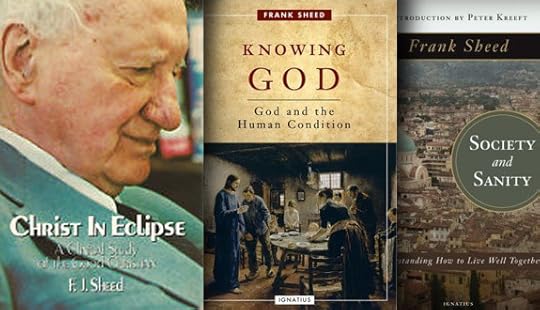
A Man Obsessed With Sanity | CWR
Author and apologist Frank Sheed, once introduced as "Aquinas in a Collar and Tie", was a master of precision and clarity
This is the second and final part of an interview with Dr. Joseph F. Martin, professor of Communication and Rhetoric at Hampton University in Virginia, about author, apologist, and publisher Frank Sheed (1897-1981). (Part one, "The Evangelistic Brilliance of Frank Sheed", was published on Sunday, February 9th.) Dr. Martin is the former art director of re:generation quarterly and his artwork has been commissioned by numerous national clients. He has also written essays and reviews for Word, Books and Culture, and other publications. In 2012, Martin was awarded his doctorate from Regent University, receiving honors for his dissertation, “Lingua Franka: An Examination of the Frank Sheed's Rhetorical Achievement”, which examined closely the unique qualities Sheed employed as speaker, apologist, author, and communicator.
The first part of this interview focuses on how Sheed helped Martin (a former Evangelical) journey into the Catholic Church, Sheed's background, Sheed's skills as a communicator, and what distinguished Sheed as an apologist. This second part examines Sheed's focus on “sanity”, compares him to G. K. Chesterton and C. S. Lewis, and highlight his key books.
CWR: Sheed once said that he was “obsessed with sanity”. What did he mean by that? How did he go about articulating this obsession?
Martin: Sheed’s apologetic anthem was animated by a counter-rhetoric of Christian Realism, one he grounded in a bass line of “Sanity.” With the onset of modernity Christians were faced with the accusation they dealt in an unreal idealism – pie-in-the-sky sentimentalism, versus real life. Sheed cried “foul”, turning the charge on its head. Christian Faith isn't escapism: it provides the one alternative that conveys a convincing narrative. And it is the Catholic Church, he maintained, despite centuries of hypocrisies and failings, that remains the custodian of the Christian Gospel, and is thus the rightful home of the “honest lover of truth.”
“Nothing is rightly seen save in the totality to which it belongs; no part of the universe is rightly seen save in relation to the whole,” Sheed explained. “But the universe cannot be seen as a whole unless one sees God as the source of the existence of every part of it… The man who does not see God may have vast knowledge of this or that section of being, but he is like a man who should know all about the eye never having seen a face. His knowledge is of items in a list, not of features in a face. The shape of things, the proportion of things, the totality of things, are unseen by him, indeed unsuspected by him.”
It was this “shape and totality” of things to which Sheed gave his life to understanding and unfolding. His entire apologetic was what G. K. Chesterton called “The Outline of Sanity.” Theology and Sanity came out in 1946, and seven years later another book called Society and Sanity, “but before writing the first of them I had been – so to speak –obsessed with sanity.” In The Church & I, Sheed concluded, “[Sanity] has been the key to all my lecturing, it at is the center of the ‘I’ who is half of this book’s title, the ‘I’ whose experience of the Church the book records.
Friends of mine, who had not read either [book]—friends don’t—were a little concerned for my mental state…They assumed I was writing about insanity—who writes whole books about sanity? I do. … By sanity I mean seeing what’s there. Who doesn’t? you ask. Who does? I answer.
I think Theology and Sanity deserves wider recognition as a minor Christian classic. Sheed’s prose achievement scores. To engage in some cross-confessional borrowing of lines (from J.I. Packer’s description of Richard Baxter’s The Reformed Pastor), Sheed’s words there “have hands and feet. They climb all over you. They work their way into your conscience.” The lover of words suffused his book’s doctrinal content with style to make it sing. An example is his explanation of the place of reason in belief. Remarking on “the extraordinary compliment that the Vatican Council paid to human reason in the year 1870,” he writes:
It defined that the existence of God can be known by the human reason without the aid of revelation. This is the mightiest compliment ever paid the human reason, and it is of faith.…What the Vatican Council put in its carefully measured words, the Holy Spirit had said a good deal more abruptly three thousand years before – ‘The fool hath said in his heart, there is no God.’ Both, as you see, come to the same thing, that the existence of God can be known by reason; therefore if you do not know it, your reasoning is defective, suggests the Vatican Council; you are a fool, cries the Psalmist under the inspiration of God.
And diffusing the most commonly heard argument from atheists, Sheed squared the case with these words:
February 10, 2014
Stupid for a TIME headline: "Poll: Catholic Beliefs At Odds With Vatican Doctrine"
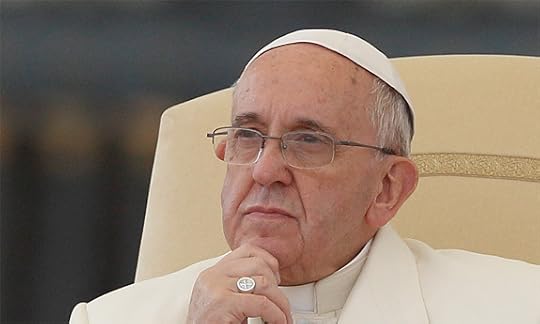
Pope Francis ponders if and when TIME magazine might issue any fundamental changes in its ideological and illogical reporting. (Okay, we made that up. At least we admit it when we make stuff up.)
by Carl E. Olson | CWR blog
I'm still laughing at this one, recently posted on the TIME magazine site:
"Poll: Catholic Beliefs At Odds With Vatican Doctrine"
Really? Whatever does that mean? That what the actual Catholic Church teaches—that is, her beliefs—is actually different from what the Vatican teaches? Huh. That would be strange, to say the least, since what the Catholic Church believes is, in fact, doctrinal, and it just happens to be the same stuff about faith and morals that the dread Vatican is supposed to be upholding, promoting, teaching, defending, clarifying, and such.
(Come to think of it, Dan Brown, how did the Catholic Church express and define doctrine before the Vatican was created centuries after the time of Christ?)
Yes, yes, I know. It's supposed to means that what certain, special, and super-enlightened Catholics believe is in opposition to "Vatican doctrine," which leaves us in a silly pickle: people who are supposedly defined by being "Catholic" are rejecting the very doctrines that, in fact, help identify and shape them as Catholic qua Catholic. Of course, you can be a baptized Catholic and say you believe adultery is wonderful, insist the Trinity is a bunch of metaphysical nonsense, and crow you have no interest in going to Mass—but that actually makes you a certain kind of Catholic: a bad Catholic.
And how do we know what constitutes being a good Catholic? Sure. In fact, there's quite a paper trail on that, beginning with the Bible, followed by Councils and such, not to mention the Catechism of the Catholic Church. Specifics? For starters, belief in the Credo, being in a state of grace, attending Mass on Sunday, and giving proper assent to the teachings—that is, doctrine—of the Catholic Church.
How about a more accurate headline? Such as: "Poll: Bad Catholics At Odds With Vatican Doctrine"
Too judgmental? Hmmm. The truth can hurt. Unless you don't believe in truth. In which case you might be a bad Catholic.
But that's not all. The piece is typical MSM boilerplate, which is to say, it employs the same old vacuous labels and confuses categories. Typical. For instance:
February 9, 2014
The Evangelistic Brilliance of Frank Sheed
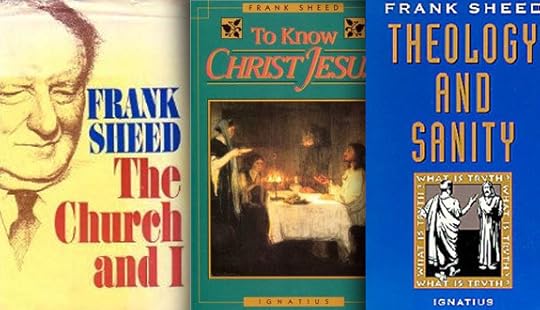
The Evangelistic Brilliance of Frank Sheed | Catholic World Report
An interview with Dr. Joseph F. Martin about one of the greatest Catholic apologists of the past century
Dr. Joseph F. Martin, is a professor of Communication and Rhetoric at Hampton University in Virginia. He is the former art director of re:generation quarterly and his artwork has been commissioned by numerous national clients. He has also written essays and reviews for Word, Books and Culture, and other publications. In 2012, Martin was awarded his doctorate from Regent University, receiving honors for his dissertation, “Lingua Franka: An Examination of the Frank Sheed's Rhetorical Achievement”, which examined closely the unique qualities Sheed employed as speaker, apologist, author, and communicator.
Although Frank Sheed (1897-1981) authored over twenty books—including Theology and Sanity, A Map of Life,Society and Sanity,Knowing God, and To Know Christ Jesus—and founded, with his wife Maisie Ward, the Sheed & Ward imprint, he is not nearly as well known as G.K. Chesterton and C.S. Lewis. Many, however, think Sheed is the equal of Chesterton and Lewis as a Christian apologist, deserving of more attention as not only a defender of the Faith, but as an evangelist, catechist, and communicator.
CWR recently interviewed Dr. Martin at length about Sheed. The first of this two-part interview focuses on how Sheed helped Martin (a former Evangelical) journey into the Catholic Church, Sheed's background, Sheed's skills as a communicator, and what distinguished Sheed as an apologist. The second part of this interview (to be published on Tuesday, February 11th) will examine Sheed's focus on “sanity”, will compare him to Chesterton and Lewis, and highlight his key books.
CWR: When you first discovered the writings of Frank Sheed, you were not yet Catholic. How did you come upon his work and what sort of impression did it make on you as an Evangelical Protestant?
Joseph Martin: People may be surprised to know Sheed grew up shaped by various non-Catholic influences. In fact, for a good while he was farmed out to the Methodists. Under their preaching he developed what his son later called a “rather Protestant crush on the personality of Jesus.” Sheed himself appreciatively admitted, “Few Catholic boys were getting as much Scripture as I got,” And though his Protestant relatives also fed him with a regular diet of anti-Catholic propaganda, he never bought it. He would intuitively embrace the sacramental faith of his mother.
When someone later told him that his Catholicism was the result of brainwashing, he said his accuser “hadn’t a notion of how many competing detergents my small brain had been scrubbed with.” So he knew all the arguments.
So there’s one reason his writing probably resonated with me. He could present the spectrum of Catholic belief along lines that were accessible to people who knew Scripture but also knew mostly caricatures of the Catholic Church. Some of these latter were off base, but some were all too close to the truth. I laughed out loud at his anecdote of attempting to deflect hecklers’ accusations that Catholics neglect the Bible. When he cockily told them Pius XI had in fact attached an indulgence to fifteen minutes of Scripture reading, they came right back at him: “‘Indulgences are not in Scripture!’ they said.”
I grew up Methodist myself — I’d experienced liturgy, a least sort of. I also crossed paths with the charismatic renewal of the 1970s and the “Born Again” phenomenon given high profile by Chuck Colson’s conversion. Young Life and InterVarsity Fellowship impacted my personal journey as well. Then there were the books of Peter Kreeft, where items I’d held to be Catholic superstitions suddenly started to sound almost plausible. It was all both simultaneously enticing and alarming to consider the Catholics might be right after all.
CWR: When did you first read something by Sheed?
February 8, 2014
Salt, Cities, and Disciples

A Scriptural Reflection on the Readings for Sunday, February 9, 2014 | Fifth Sunday in Ordinary Time | Carl E. Olson
Readings:
• Is 58:7-10
• Ps 112:4-5, 6-7, 8-9
• 1 Cor 2:1-5
• Mt. 5:13-16
It is small, simple, and composed mostly of something that doesn’t sound tasty at all: sodium chloride. But the importance of salt in the ancient world is hard to overstate, even if it is usually taken for granted in our own day. Salt was valued so much among the Romans that spilling it was interpreted as a bad sign. The word “salary” is derived from the word “salt”, in reference to payments made to Roman soldiers (either in salt, or so they could purchase salt); a bad soldier was sometimes described as “not worth his salt”.
Similarly, we are all familiar with the expression, “He is the salt of the earth.” That phrase comes from today’s Gospel reading and Jesus’ declaration in the Sermon on the Mount, “You are the salt of the earth.” This was high praise when we consider that salt often played a role in the rise and fall of nations and civilizations. Before refrigeration and other modern means of preserving food, salt was vital to keeping food pure and edible, which in turn had a significant effect on the health, stability, and success of ancient peoples.
This important place and positive affect of salt is seen in passages in the Old Testament. In the book of Job, the question is asked, “Can that which is tasteless be eaten without salt…?” (Job 6:6), and the author of Sirach states, “Chief of all needs for human life are water and fire, iron and salt…” (Sir 39:26). Newborn babies were rubbed with salt (cf. Ez. 16:4), and certain burnt offerings were sprinkled with salt (Lev 2:13; Num 18:19; Ez 43:24), which symbolized the indissoluble, covenantal relationship between God and the chosen people of Israel.
In the positive sense used by Jesus, to be salt of the earth is to work to preserve life, to be pure, and to exemplify holiness. “Jesus signifies that all human nature has ‘lost its taste’”, wrote St. John Chrysostom, “having become rotten through sin.” This plays on the double meaning of the Greek language, in which the phrase “loses its taste” can also mean “has become foolish and dull”. Mankind has lost its moral awareness and sense of holiness, and Christ’s disciples are to restore what has been lost, drawing men and women to the source of eternal life.
Jesus then said, “You are the light of the world.” This builds upon St. Matthew’s reference, in the previous chapter, to “the people who sat in darkness” having “seen a great light” (Mt 4:16; cf. Isa 9:1-2). The reference to “a city set on a mountain” is also drawn from the prophet Isaiah, who envisioned a time when “the mountain of the house of the Lord shall be established as the highest of the mountains” (Isa 2:2). That is “the city of the living God, the heavenly Jerusalem” mentioned in the Epistle to the Hebrews, the eternal home for those who, as members of the Church, journey toward the Kingdom.
“The humble city is the society of holy men and good angels,” wrote St. Augustine in his great work, City of God, “the proud city is the society of wicked men and evil angels. The one city began with the love of God; the other had its beginnings in the love of self” (Bk. XIV, ch. 13). Those who are motivated by a vanity and narcissism live in darkness; they are consumed by themselves and destined for eternal darkness if they do not change their ways.
But those who follow Christ are filled with the life and light of God: “Just so, your light must shine before others…” Why? So that the world—filled with corruption and sin, lacking salt and the taste of goodness—will see the good deeds done by grace and glorify God. “It is only for the sake of God’s glory that we should allow our good works to become known”, noted Augustine. That should be the goal of every disciple worth his salt.
(This "Opening the Word" column originally appeared in the February 6, 2011, issue of Our Sunday Visitor newspaper.)
February 7, 2014
Carl's (Seven) Cuts for (a Snowy) Friday
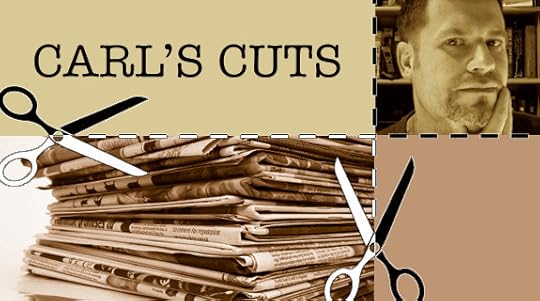
Carl's (Seven) Cuts for (a Snowy) Friday | Carl E. Olson | CWR Blog
Converts, the U.N. and the Vatican, Abp. Aguilar under attack, Hoffman's funeral, Gioia's award, Glass's empty hatred, and the Rolling Stoned article
Seven cuts for a cold and snowy Friday:
• Did you know that most, if not all, of the troubles in the Catholic Church can be traced back to one group of people? Yep. The offenders are commonly called “converts”, but they are really the pawns (and spawn?) of Satan:
The Protestant invasion (Hahn, Ray, Shea et al) has made Catholics sceptical of their own tradition. … Until the Protestant invasion, “the first seven years were the ones that count”. Every Catholic possessed the short pithy responses of the Baltimore Catechism as their lifelong possession. Newman in the Idea of a University tells the story of three Anglican ministers traveling in Ireland. They were guided by a 13 year old youth who surpassed them in his knowledge of the Catechism.
As one commenter noted, “Here's a pointer: to maintain the least modicum of internal consistency, avoid citing Newman in polemics against converts.” I suspect that St. Paul would agree.
• You've likely read about the January 31st report, “Concluding observations on the second periodic report of the Holy See” (PDF) issued by the United Nations Committee on the Rights of the Child. Many have described as an attempt to bully the Catholic Church about her teachings on sexuality, abortion, and contraception, and, after having read the document, I think that is an accurate and fair description. Although the text is bureaucratic in tone, the hubristic condescension and arrogance is quite thick. For example:
56. The Committee is seriously concerned about the negative consequences of the Holy See’s position and practices of denying adolescents’ access to contraception, as well as to sexual and reproductive health and information.
57. With reference to its general comments No. 15 (2013) on the right of the child to the enjoyment of the highest attainable standard of health, No. 4 (2003) on adolescent health and No.3 (2003) on HIV/AIDS and the rights of the child, the Committee reminds the Holy See of the dangers of early and unwanted pregnancies and clandestine abortion which result notably in high maternal morbidity and mortality in adolescent girls, as well as the particular risk for adolescents girls and boys to be infected with and affected by STD s, including HIV/AIDs. The Committee recommends that the Holy See :
(a) Assess the serious implications of its position on adolescents’ enjoyment of the highest attainable standard of health and overcome all the barriers and taboos surrounding adolescent sexuality that hinder their access to sexual and reproductive information, including on family planning and contraceptives, the dangers of early pregnancy, the prevention of HIV/AIDS and the prevention and treatment of sexually transmitted diseases (STDs)...
And then, having issued that amoral-laden lecture, the committee has the temerity to state:
(f) Take measures to raise awareness of and foster responsible parenthood and sexual behaviour, with particular attention to boys and men
Yeah, right. The United Nations has, for quite some time, been promoting or aiding irresponsible sexual activity, contraception, and abortion throughout the world. Mary Jo Anderson, writing fifteen years ago, reported on how the United Nations Hague Forum was attacking “parental rights, national sovereignty, and religious freedom while it thrusts forward universal access to abortion under the cover of 'reproductive health and rights.'” That February 1999 meeting was hosted by the government of the Netherlands and the United Nations Population Fund (unfpa), “courtesy of the Bill Gates and Ted Turner foundations.” Anderson wrote:
Grace and Reason According to St. Paul and St. Thomas
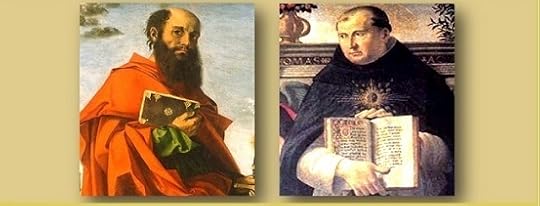
Grace and Reason According to St. Paul and St. Thomas | Dr. Eric M. Johnston | HPR
…the world we live in is overwhelmingly irrational. Our popular discourse doesn’t make any sense at all. As Catholics, we need to understand what our faith teaches about this irrationality. We need to look to Scripture and tradition.
A recent week’s politics left Catholics reeling. The Supreme Court says there is no reason but bare animus to believe that marriage between a man and a woman is different from any other relationship—the most basic biology is treated like the most bizarre doctrine of faith.
The mass media acclaim a woman in Texas who, aided by a screaming mob, thwarted a measure supported by two-thirds of the people of the state. The “extreme” measure prevents abortion only after twenty weeks, and requires that abortionists have faculties to admit a hemorrhaging woman into the hospital.
And the mass media jeer the governor of Texas for pointing out that the woman who filibustered the bill is herself a beautiful exemplar of why we should count no life as hopeless. She was the daughter of an uneducated single mother, and then herself an uneducated single mother—but went on to be first in her college class, then a graduate of Harvard Law School, and now a state senator, before acquiring this new, dubious claim to fame.
In short, the world we live in is overwhelmingly irrational. Our popular discourse doesn’t make any sense at all. As Catholics, we need to understand what our faith teaches about this irrationality. We need to look to Scripture and tradition.
We often feel torn in two directions. We are tempted to wash our hands of the world. There is sometimes talk, even gleeful, that America, and maybe the world, is coming to an end. We will be persecuted. We can never win the public debate. We look forward to an age of martyrdom. There is no hope.
But we are also tempted in the opposite direction.
February 6, 2014
"Sola Shea": Mark Shea interviews Mark Shea about "By What Authority? An Evangelical Discovers Catholic Tradition"
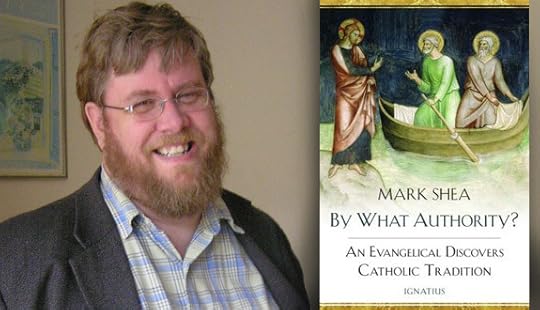
Sola Shea | Catholic World Report
Mark Shea interviews Mark Shea about
By What Authority? An Evangelical Discovers Catholic Tradition
Editor's note: I've known Mark Shea for many years, having first met him in person about ten years ago in Seattle, just a few hours up the road from where I live. A few years ago, I interviewed Mark about his Marian trilogy, published by Catholic Answers. As I thought about interviewing Mark about the revised and expanded edition of his book, By What Authority? An Evangelical Discovers Catholic Tradition (Ignatius Press, 2013), I thought, “I need someone who can really get into Mark's head. Someone who know him better than most and who can ask the difficult, even awkward, questions.” And then I realized who would be the perfect interviewer. What follows is that the interview of Mark Shea by Mark Shea, or of “Mark” by “Shea” for those who cannot tell them apart.
-------------
There is only one drawback for me to this interview: having to interview that guy, whose faults are particularly well-known to me. I grew up with him and there are plenty of stories I could tell you. He is a guy who has spent more time eluding my salient criticisms and critiques—sometimes living in denial, sometimes promising reform and then skipping out when the kitchen got too hot, always slow to serious action—than anybody else on planet Earth. Abrasive, opinionated, quick to see the speck in the eyes of others and slow to see the log in his own eye. He has a juvenile sense of humor and a thin skin. He is notoriously prideful and childishly vain. He is, shall we say, “portly” and not what you would call a champion at self-restraint. He has a talent for making enemies and a certain listlessness when it comes to attending to the work that he needs to be doing. Nor does he have any particular academic training beyond his tepid BA in English.
Essentially, he has a big mouth and a bunch of opinions and yet somehow managed to persuade a lot of people that saying them aloud is sufficient reason for them to listen to him. There are any number of people who can’t stand him, me among them many days of the week, and I have to restrain myself from letting my hostility to him bleed into the conversation. However, I think I mostly managed it.
Mark: So. There are fifty jillion conversion stories out there. Why would you ever imagine yours is so important that it needs to be read by anybody else? What’s the big deal about By What Authority? and why does it matter that you just revised and expanded the book when it has been in print since 1996?
Shea: Well, when you put it that way, I didn’t really think of the book as a conversion story, but as an argument: one conducted (in my head) with friends from my old church and constructed—very consciously—along the lines of a sort of mystery story.
Mark: Not a conversion story?
Shea: No. Not really. By What Authority? deals with a single thread out of a whole tapestry of thoughts, emotions, struggles and problems I grappled with as I was coming into the Church. I have never really written up what I would call my conversion story, though I have told it and you can hear that story (if you like) by getting hold of a four-CD set that I did ages ago for St. Joseph Communications called Making Senses Out of Scripture. Three of the CDs are a seminar I did on my book of the same name. The fourth is my conversion story. The question of Sacred Tradition and the canon of scripture plays a role in that story, but lots of other things come in as well.
Mark: So are you saying that By What Authority? is not really giving the reason you converted?
Shea: No. I’m saying By What Authority? is describing only one of the reasons I converted. People seldom convert for a single reason, at least not when the conversion is a healthy one. Rather, you come to see that, as von Balthasar put it, “Truth is symphonic”. It’s not just that you realize that Sacred Tradition points toward the Church, or that Scripture points toward the Real Presence, or that the Magisterium and papacy make sense, or that Marian devotion is obviously apostolic and ancient. It’s that, eventually, everything starts pointing to the Faith like the spokes on a wheel. You reach a tipping point at which you realize the question is no longer “Why be Catholic?” but is rather “Why not be Catholic?” You start to realize the Church doesn’t tell this truth and that truth, but that it is a divinely constituted truth-telling thing, even when its member may be liars and scoundrels. And you are hard put to it to find good rebuttals to its teachings.
Mark: So you decided to grace the Church with your presence?
Carl E. Olson's Blog
- Carl E. Olson's profile
- 20 followers




